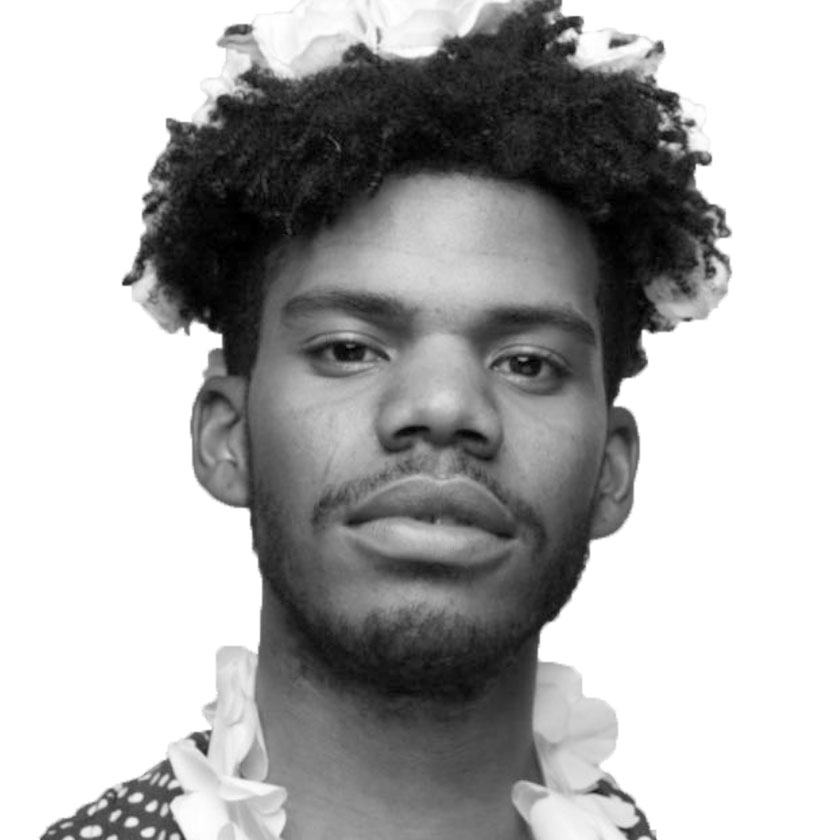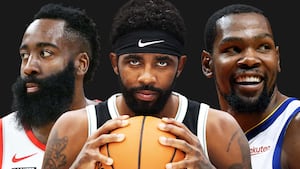The Brooklyn Nets announced that star shooting guard Kyrie Irving would not join the team this season—which starts on Oct. 18—until he’s able to be “a full participant.” That means no practices, no games, and of course missing at least half of his game checks, amounting to millions of dollars in losses.
The championship-winning guard took to Instagram last night stating that he is neither pro- nor anti-vaccine, but that he’s choosing what’s best for him. “I’m not going to be used as a person within this agenda,” he said on IG Live. “I’m just saying it should not be divided amongst all of us, it should be understood among us… this is not about the Nets, not my teammates, the organization… it’s not politics, it’s not any one thing.”
Before he ever got on Live, sports pundits were quick to say that Irving should not be considered a martyr, though it doesn’t seem like he ever positioned himself as one. Regardless, on Thursday morning, former NBA star Stephon Marbury compared his struggle against the state’s vaccine mandates to the political struggles of boxing legend Muhammad Ali, with many folks ridiculing that analogy while others stood in agreement.
Okay, let’s get this out of the way: Irving, despite what Stephon Marbury would have us believe, is no Ali. But the distinction between them is very significant in the ways that popular—often racist—discourse around Irving has been constructed. The only commonality between the two sports figures is a resistance to control. For Ali, it was the control of the draft, which would send him to Vietnam to kill “enemies” of the expanding U.S. empire that was taking part in an ever-continuing colonial project in Asia. For Irving, it’s resistance against being vaccinated in the name of public health and safety. They both stand in protest of the state’s power to dictate a person’s ability to determine their own destiny.
The difference between Irving and Ali lies in what they actually stand for. Ali was a part of a larger organization—first the Nation of Islam, and later Sufism—that had a political ideology, one that stood in direct conflict with the primary aims of America. He also was prominently featured in pro-vaccine PSAs in 1978, wherein his vaccination was televised for a live-viewing audience. In Irving’s case, his skepticism isn’t attached to any particular ideology—in fact, it’s hardly a principle at all—and so, despite his best efforts to not be subsumed in a particular “agenda,” whether it be the anti-vaxxers or conspiracy theorists, his words are being taken, shaped, and sharpened by those looking to make some political statement.
Ali’s words, too, were taken from him and misinterpreted, but one could always go to the source to find out what he actually believed. He wasn’t shy about that at all, and the stakes of his political outspokenness were much weightier than Irving’s. Ali was not only stripped of his titles and banned from boxing, but was sentenced to five years in prison for draft evasion before the conviction was overturned on appeal. Irving stands to lose millions of hoop dollars but hasn’t lost his ring, hasn’t lost a single endorsement, and hasn’t really been censored from sharing his opinions on the matter at all. While they’ve both been subject to racist readings of their beliefs, at the very least, we knew what Ali’s beliefs were, where they came from, and who he struggled alongside. Irving has shown very little in the way of actual political ideology or organizing principle.
The one chance we had to peek behind Irving’s curtain was at the beginning of the pandemic. The NBA was deciding whether a bubble season at ESPN’s Wide World of Sports’ facilities in Florida, in order to recoup losses due to the pandemic pause and fulfill their contractual obligations to TV networks, would work for the players. At the time, Irving, alongside other players like Avery Bradley, advocated that hoopers boycott the idea of the bubble given the timing; this was, of course, amid the global demonstrations against policing in the wake of George Floyd and Breonna Taylor’s murders.
Irving wanted the league to focus its efforts on raising awareness for injustices in the very locales that many of its players grew up in. At the time, scoop merchants like Adrian Wojnarowski called Irving a “disrupter,” saying that Irving “relished the clash” between the league’s superstars who wanted to restart the season and the groundswell of players who might actually believe that there are aspects to one’s life beyond honoring contracts for the league and its owners. As players were discussing whether to boycott the bubble, though, they ran into this very discursive problem that differentiates Irving from Ali.
In the now-infamous Zoom call, wherein players from both the NBA and WNBA came together to discuss their next moves, superstars like then-NBA Players Association President Chris Paul and Lakers forward Carmelo Anthony questioned the aim of the strike. Matt Sullivan, writing for ESPN and later in his book, Can’t Knock the Hustle: Inside the Season of Protest, Pandemic, and Progress with the Brooklyn Nets’ Superstars of Tomorrow, reported that as union president, Paul set the table for discussion, cautioning not to get “too specific about new plans for negotiations on the call” for fear that it’d be leaked to the press. But movements like this need an organizing principle—a particular and unique ideology that brings them together. So when Anthony questioned the wider body, asking, “What do we stand for?” Irving’s repetition of the word “unity” largely fell on deaf ears.
What actually unifies hoopers? Their love of the game and the social and financial capital that comes with it. Outside of that, there isn’t some political belief or rationale to organize against the continuation of play. That’s why, when Irving was actually proven right in his push for boycotting, the wildcat strike started by the Milwaukee Bucks that quickly spread throughout many players and teams was easily squashed after a call between Barack Obama and LeBron James cooled the tensions. Barry and James played up the very unity that Irving was speaking toward but used their love of the game and the platform that players have with it to quell the real organizing that could have manifested from that moment.
Now that it’s passed, it’s still unclear whether Irving has a particular ideology or principle that goes beyond skepticism. Though his previous stint as a flat earther and, as Rolling Stone reported, “liking Instagram posts from a conspiracy theorist who claims that ‘secret societies’ are implanting [COVID] vaccines in a plot to connect Black people to a master computer for ‘a plan of Satan’”—as well as beliefs that the assassination of John F. Kennedy was tied to the U.S. Federal Reserve and that the CIA tried to kill reggae legend Bob Marley—drop him in the “conspiracy theorist” bucket, it is clear that Irving actually gives a damn.
As the bubble games wore on, Irving reconnected with his indigenous roots at Standing Rock (his mother was half-Sioux), not just becoming a member of the Sioux tribe, but fighting against the Dakota Access Pipeline, making six-figure donations to the tribe’s youth programs, providing two truckloads of food and, yes, 3,000 N95 masks to those living on the reservation. In 2020, he committed $1.5 million to WNBA players who chose to sit out their bubble season, whether because of the virus or because they wanted to participate in demonstrations for social justice. And just this past summer, Irving partnered with the Michigan-based Paani Project to build a solar-powered water plant in Rohal, Pakistan—one of the hottest and poorest regions in the country—to provide thousands of villagers with clean drinking water.

We don’t often get a sense of what Irving believes, politically, about the world, but through actions we can carve out who he prioritizes. It may seem contradictory, then, that he would become the face of vaccine skepticism in the league. We might be able to chalk that up to reporters like Woj and bloviators like ESPN’s Stephen A. Smith, who are more interested in clicks rather than care. We might also be able to point to a media world that has no problem with making Black people the mascots for that skepticism—misusing Black people’s violent relationship with medical care and our relative lack of access to proper health insurance as a way to categorize Black people as backward. That’s not to say that regardless of the NBA’s strict COVID protocols, Irving wouldn’t be putting anyone in danger if he was able to play for the Nets this season, flying around from city to city, but it does belie the idea that he’s wholly apathetic to the plight of his fellow humans.
The problem is, we simply don’t know enough about Irving’s political leanings. We don’t know who he’s organizing with or if he’s organizing at all. It seems he’s just wide open to questioning things—no matter how based in perceivable fact the truth might be—and wants to take his time with the vaccine. But capitalism and team chemistry waits for no man. The labor has to be performed, the bonds have to be strengthened. It seems that Irving is still searching for a principle that works for him, and he’s doing so without the united front from the NBA that he desired a few years ago. But the time for decision-making around the vaccine, according to the NBA and the state of New York, is nigh. Over 44 million cases and 700,000 people dead from this virus is nothing to play with. Unfortunately, the world doesn’t operate on Irving time.






